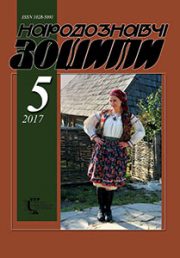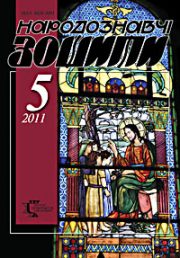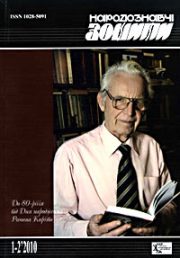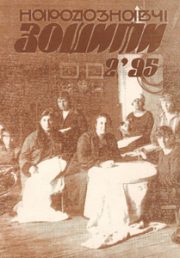2020 #6 Sokil V.
The Ethnology Notebooks. 2020. # 6 (156), 1407—1416
УДК 37.091.011.3:94-051
DOI https://doi.org/10.15407/nz2020.06.1407
Vasyl SOKIL
- ORCID ID: http://orcid.org/0000-0003-3164-1217
- Doctor of Philology, Professor, Head of Department,
- The Ethnology Institute National Academy of Sciences of Ukraineб
- Department of Folklore,
- Lviv-center, 15 Svobody ave.
- 79000, Lviv City
- e-mail: vasylsokil@gmail.com
MYKHAILO ZUBRYTSKY’S ACTIVITIES IN SCIENTIFIC INTERESTS OF HRYHORIY DEMYAN
The article examines the scientific achievements of M. Zubrytskyi — a priest, ethnographer, public and cultural figure. It presents one of the best articles by H. Demian — «Little Known Pages of Life and Scientific Work of Mykhailo Zubrytskyi», which contains biographical information about the scholar, his historical and ethnographic researches, and publications on Ukrainian emigration. Emphasis is placed on his diverse interests, notably folk calendars, farming, construction. National and state views are considered in another work, which clarifies the place of the Ukrainian language in the national life, the electoral system, education, the role of priests in shaping the consciousness of their compatriots, awareness of national identity.
Considerable attention is paid to M. Zubrytskyi’s autobiography, which is for the first time offered to the readers in full. Most of the comments to it are written by H. Demian. It contains data on the childhood and adolescence of M. Zubrytskyi, his schooling, education at the seminary, pastoral work. It also shows the development of his scientific potential. An important biographical note is the «Slovenian Diary», which describes the most difficult period of his life and his stay in the Thalerhof concentration camp. Even there M. Zubrytskyi contributed to the scientificdatabase on history, ethnography, especially Slovenian culture. He chronicled the events of the establishment of power of the West Ukrainian National Republic (WUNR).
Personal documents of M. Zubrytskyi, which are kept in the home archive of H. Demian, arethe new material of the study. They reproduce the early (family period) of his life, study, military service, theological education, pastoral and scientific activities. The notebook of the priest, which is an important source of knowledge about his scientific activity (register of his own publications, extracts from various literary, historical and philosophical works),is presented from the home archive of H. Demian. Theinformation on scientific research of M. Zubrytskyi also entered other registers (those of B. Hrinchenko, O. Andrievsky, etc.). The complete bibliography of the researcher’s publications(352 items) was prepared by H. Demian. It is annotated, includes complete basic data. All these documents and materials duly revealed the creative portrait and civic position of this extraordinary priest.
Keywords: scientific interests, historical, ethnographic research, autobiography, notebook, bibliography.
REFERENCES
- Dem’yan, H. (1972, 23 november). Historian and ethnographer from Kindratov. Lenin’s way. Turka [in Ukrainian].
- Dem’yan, H. (1985). Frankish layer of Carpathian studies. Chronicle of Boykivshchyna (Part 1) [in Ukrainian].
- Dem’yan, H. (1990). Zubrytsky Mykhailo Ivanovych. Ukrainian literary encyclopedia. Kyiv: URE them. M.P. Bazhana [in Ukrainian].
- Dem’yan, H. (2007). Mykhailo Zubrytsky. A small encyclopedia of Ukrainian ethnography. Lviv [in Ukrainian].
- Dem’yan, H. (1992). Little-known pages of the life and scientific work of Mykhailo Zubrytsky. NTSh notes (Vol. 223, pp. 172—196). Lviv [in Ukrainian].
- . Dem’yan, H. (2016). Little-known pages of the life and scientific work of Mykhailo Zubrytsky. Mykhailo Zubrytsky. Collected works and materials (Vol. 2, pp. 367—395). Lviv: Litopys [in Ukrainian].
- Dem’yan, H. (2016). National-state direction of Mykhailo Zubrytsky’s activity. In Mykhailo Zubrytsky. Collected works and materials (Vol. 2, pp. 396—417). Lviv: Litopys [in Ukrainian].
- Mykhailo Zubrytsky. Autobiography. Collected works and materials (Vol. 2, pp. 53—101) [in Ukrainian].
- Zubrytsky, P. (1970). Biography of Fr. Mykhailo Zubrytskyi. Chronicle of Boykivshchyna (Parts 1—2) [in Ukrainian].
- Dem’yan, H., & Chancellor, L. (1989). Mykhailo Zubrytsky and his Slovenian diary. Questions of textology. Pre-October and Soviet literature. Collection of scientific works (Pp. 209—231). Kyiv: Naukova dumka [in Ukrainian].
- Dem’yan, H., & Chancellor, L. Mykhailo Zubrytsky and his Slovenian diary. Collected works and materials (Pp. 102—148) [in Ukrainian].
- Phototypes of documents of the archive of Mykhailo Zubrytsky. Zubrytsky M. Collected works and materials (Vol. 2, pp. 323—366) [in Ukrainian].
- Zubrytsky, M. Notebook (facsimile). Collected works and materials (Vol. 2, pp. 153—246) [in Ukrainian].
- Levitsky, I. (Ed.). (1888—1895). Galician-Russian bibliography of the XIX century (1801—1886) (Vol. 2). Lviv [in Ukrainian].
- Levitsky, I. (Ed.). (1909). Ukrainian bibliography of Austria-Hungary 1887—1900 (Vol. 1). Lviv [in Ukrainian].
- Grinchenko, B. (Ed.). (1901). Literature of Ukrainian folklore. 1777—1900. Experience of bibliographic index. Chernigov [in Russian].
- Andrievsky, O. (Ed.). (1930). Bibliography of Ukrainian folklore (Vol. 1). Kyiv [in Ukrainian].
- Babyak P. (Ed.). (1968). Life and the Word. 1894—1897. Systematic index of content. Lviv [in Ukrainian].
- Kizyk, O. (Ed.). (1988). Dawn (1880—1897). Systematic index of journal content. Lviv [in Ukrainian].
- Mayher, W. (Ed.). (2003). Bibliography of the Notes of the Shevchenko Scientific Society. Lviv [in Ukrainian].
- Mayher, W. (Ed.). (2007). Materials for the Ukrainian-Russian ethnology of the Scientific Society named after Shevchenko. Bibliography. Lviv [in Ukrainian].
- Mayher, W. (Ed.). (2007). Ethnographic collection of the Scientific Society. Shevchenko. Bibliography. Lviv [in Ukrainian].
- Kurylyshyn, K. (2015). Dilo Magazine (Lviv, 1880—1939): materials for bibliography (Vol. 1: 1880—1889). Drogobich: Kolo [in Ukrainian].
- Demyan, G., & Sokil, V. Mykhailo Zubrytsky. Bibliography. Mykhailo Zubrytsky. Collected works and materials (Vol. 2, pp. 525—592) [in Ukrainian].







